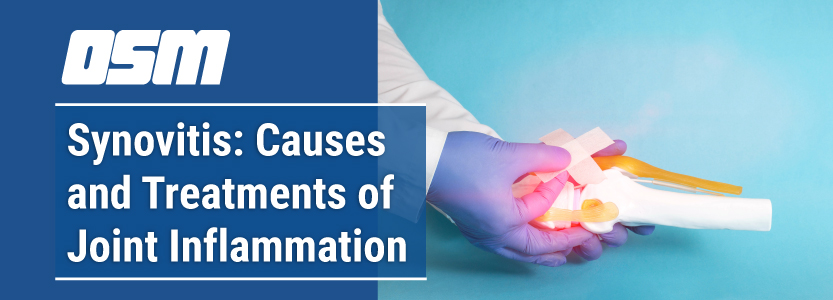Synovitis: Causes and Treatments of Joint Inflammation
Article featured on Verywellhealth
Synovitis is a condition that occurs when there is inflammation of the synovial tissue, the lining of a joint. This condition can cause joint pain and swelling. It is the hallmark of all inflammatory joint diseases.
This article will explain what synovial tissue is, the causes of synovitis, and how you can treat the condition so you can gain relief from the inflammation and pain.
What Is the Synovium?
The synovium is a thin layer of tissue that lines the joints and tendon sheaths; it is only a few cells thick. The synovium acts to control the environment within the joint and tendon sheath. It does this in two ways:
First, it acts as a membrane to determine what can pass into the joint space and what stays outside.
Second, the cells within the synovium produce substances that lubricate the joint.
Synovitis Symptoms
The signs of synovitis are similar to other joint disorders:
- Arthralgia, aching or pain in the joint
- A warm sensation in the area of the joint
- Stiffness, which may be worse when you first wake up
- Swelling; although in some cases, your joint may not swell at all.
You may feel the symptoms of synovium inflammation in different joints throughout your body, or the pain and discomfort might be restricted to one area.
Causes of Synovitis
The primary cause of inflammation of the synovium is related to an overactive immune system. In these situations, your immune system attacks your healthy synovium. This causes excessive growth of the synovium. The membrane becomes inflamed and produces additional synovial fluid.
With these conditions, the joint cartilage and bone can eventually become damaged, leading to stiffness, swelling, warmth in the joint, and significant pain.
Inflammation of the synovial tissue is often related to arthritic conditions. It’s most common in rheumatoid arthritis (RA). However, it also presents with psoriatic arthritis, lupus, and gout.
Synovitis can also be seen with trauma and infection.
Diagnosis
When diagnosing synovitis, a healthcare provider usually starts with a physical exam of the joints, checking for warmth and seeing if they are tender when touched. The thickening of the area manifests as a sponginess that can be felt.
In cases where the inflammation is related to a joint that is deeper under the skin and can’t be checked by hand or eyes, your healthcare provider may order an MRI or musculoskeletal ultrasound.
Treatment
To reduce inflammation and relieve pain, your healthcare provider will likely advise rest and nonsteroidal anti-inflammatory drugs (NSAIDs).
Disease-modifying antirheumatic drugs (DMARDs) that help manage arthritis may also relieve symptoms of synovitis. Sometimes, your healthcare provider may prescribe steroid injections to reduce swelling and discomfort.
If medication does not help ease synovitis, you may be referred to an orthopedic surgeon who can perform a synovectomy. This is a procedure in which part of the synovium is removed.
Summary
Synovitis is the medical term for inflammation of the tissue that lines your joints. This tissue can become damaged, which leads to a thickening of the membrane and excessive fluid. An underlying autoimmune disease that affects the joints, usually RA, is the most likely cause of synovitis, but other types of arthritis and wear and tear can also cause it.
Anti-inflammatory medications are the first line of treatment. However, DMARDS, steroid injections, or even surgery may be required to relieve your pain.
The Orthopedic & Sports Medicine Center of Oregon is an award-winning, board-certified orthopedic group located in downtown Portland Oregon. We utilize both surgical and nonsurgical means to treat musculoskeletal trauma, spine diseases, foot and ankle conditions, sports injuries, degenerative diseases, infections, tumors and congenital disorders.
Our mission is to return our patients back to pain-free mobility and full strength as quickly and painlessly as possible using both surgical and non-surgical orthopedic procedures.
Our expert physicians provide leading-edge, comprehensive care in the diagnosis and treatment of orthopedic conditions, including total joint replacement and sports medicine. We apply the latest state-of-the-art techniques in order to return our patients to their active lifestyle.
If you’re looking for compassionate, expert orthopedic and podiatric surgeons in Portland Oregon, contact OSM today.
Phone:
Address
1515 NW 18th Ave, 3rd Floor
Portland, OR 97209
Hours
Monday–Friday
8:00am – 4:30pm




